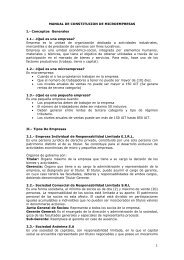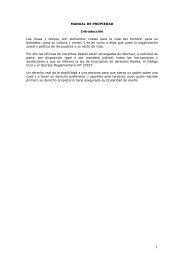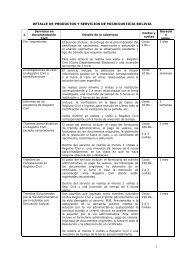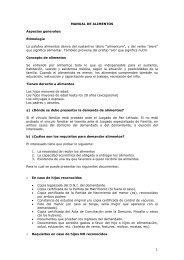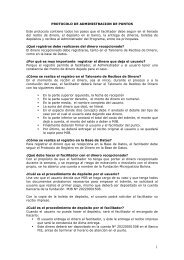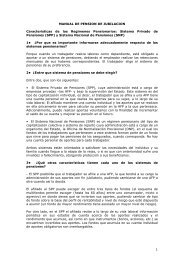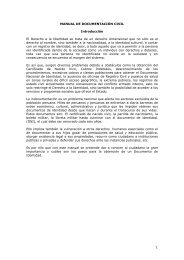ICISS report - International Coalition for the Responsibility to Protect
ICISS report - International Coalition for the Responsibility to Protect
ICISS report - International Coalition for the Responsibility to Protect
You also want an ePaper? Increase the reach of your titles
YUMPU automatically turns print PDFs into web optimized ePapers that Google loves.
The <strong>Responsibility</strong> <strong>to</strong> <strong>Protect</strong> 31<br />
❏ Suspension of membership or expulsion from international or regional bodies,<br />
and <strong>the</strong> loss this may entail not only of national prestige, but also of technical<br />
cooperation or financial assistance countries may receive from such bodies, is<br />
ano<strong>the</strong>r increasingly used <strong>to</strong>ol.<br />
❏ Refusal <strong>to</strong> admit a country <strong>to</strong> membership of a body is a corollary of <strong>the</strong> <strong>for</strong>egoing<br />
which has sometimes been employed <strong>to</strong> good effect.<br />
THE DECISION TO INTERVENE<br />
Extreme Cases Only<br />
4.10 In extreme and exceptional cases, <strong>the</strong> responsibility <strong>to</strong> react may involve <strong>the</strong> need <strong>to</strong><br />
resort <strong>to</strong> military action. But what is an extreme case? Where should we draw <strong>the</strong> line in<br />
determining when military intervention is, prima facie, defensible?<br />
4.11 The starting point, here as elsewhere, should be <strong>the</strong> principle of non-intervention.<br />
This is <strong>the</strong> norm from which any departure has <strong>to</strong> be justified. All members of <strong>the</strong> United<br />
Nations have an interest in maintaining an order of sovereign, self-reliant, responsible, yet<br />
interdependent states. In most situations, this interest is best served if all states, large and<br />
small, abstain from intervening or interfering in <strong>the</strong> domestic affairs of o<strong>the</strong>r states. Most<br />
internal political or civil disagreements, even conflicts, within states do not require coercive<br />
intervention by external powers. The non-interference rule not only protects states and<br />
governments: it also protects peoples and cultures, enabling societies <strong>to</strong> maintain <strong>the</strong><br />
religious, ethnic, and civilizational differences that <strong>the</strong>y cherish.<br />
4.12 The norm of non-intervention is <strong>the</strong> equivalent in international affairs of <strong>the</strong><br />
Hippocratic principle – first do no harm. Intervention in <strong>the</strong> domestic affairs of states<br />
is often harmful. It can destabilize <strong>the</strong> order of states, while fanning ethnic or civil strife.<br />
When internal <strong>for</strong>ces seeking <strong>to</strong> oppose a state believe that <strong>the</strong>y can generate outside support<br />
by mounting campaigns of violence, <strong>the</strong> internal order of all states is potentially compromised.<br />
The rule against intervention in internal affairs encourages states <strong>to</strong> solve <strong>the</strong>ir own<br />
internal problems and prevent <strong>the</strong>se from spilling over in<strong>to</strong> a threat <strong>to</strong> international peace<br />
and security.<br />
4.13 Yet <strong>the</strong>re are exceptional circumstances in which <strong>the</strong> very interest that all states have in<br />
maintaining a stable international order requires <strong>the</strong>m <strong>to</strong> react when all order within a state<br />
has broken down or when civil conflict and repression are so violent that civilians are threatened<br />
with massacre, genocide or ethnic cleansing on a large scale. The Commission found in<br />
its consultations that even in states where <strong>the</strong>re was <strong>the</strong> strongest opposition <strong>to</strong> infringements<br />
on sovereignty, <strong>the</strong>re was general acceptance that <strong>the</strong>re must be limited exceptions <strong>to</strong> <strong>the</strong><br />
non-intervention rule <strong>for</strong> certain kinds of emergencies. Generally expressed, <strong>the</strong> view was that<br />
<strong>the</strong>se exceptional circumstances must be cases of violence which so genuinely “shock <strong>the</strong><br />
conscience of mankind,” or which present such a clear and present danger <strong>to</strong> international<br />
security, that <strong>the</strong>y require coercive military intervention.<br />
4.14 Given this broad international agreement on <strong>the</strong> need, in exceptional cases of human<br />
risk, <strong>for</strong> coercive military action across borders, <strong>the</strong> task is <strong>to</strong> define, with as much precision<br />
as possible, what <strong>the</strong>se exceptional circumstances are, so as <strong>to</strong> maximize <strong>the</strong> chances of<br />
consensus being reached in any given case. What is <strong>the</strong> precise threshold of violence and



